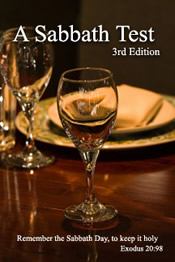


Appendix VII
"Seven Prohibitions"
Every time one of God’s people goes to a restaurant on the Sabbath or holy day, he or she is transgressing numerous aspects of the fourth commandment. Consider what God specifically prohibited His people from doing on this day.
You shall not acquire food on the Sabbath
God actually rebuked the Israelites when they attempted to engage in this practice. His exact words were, “How long refuse you to keep my commandments and my laws?” (Ex. 16:26-28) He uttered them after the Israelites went out to gather food (manna) on the Sabbath.
You shall not prepare food on the Sabbath
God specifically instructed the Israelites to do their meal preparation on the sixth day (Ex. 16:23). Furthermore, at no time did He suggest that they could commission others to prepare it for them on the Sabbath. He actually indicated that the preparation day was given to “prove” the Israelites and to test their obedience (Ex. 16:4).
You shall not go outside your place on the Sabbath
God revealed this specific aspect of His command because the Israelites went outside the camp to obtain food on the Sabbath (Ex. 16:29). Furthermore, God was furious with this practice and He made that fact abundantly clear.
At this point, it is interesting to note that the only way God’s people today can avail themselves of a restaurant on the Sabbath is to go outside of “their place.” They must literally go out into the world where God’s Sabbath is being profaned and avail themselves of this sin. Despite this fact, many believe God somehow condones this practice.
You shall not labor on the Sabbath
God first addressed the issue of work on the Sabbath when He made the seventh day. At that time, the Great Creator of heaven and earth rested from His labor (Gen. 2:2-3). Later, when giving the Ten Commandments on Mount Sinai, God made reference to this rest. Through the Sabbath commandment, God is declaring that our lives should be like His. Labor should not be a part of this day – directly or indirectly.
Additionally, God knew that there were only two broad sources of labor – the work you perform, and the work that is performed for you. The fourth commandment addresses both types. First, you shall not do any work on the Sabbath. That addresses your part. Secondly, no one who comes into your sphere of influence shall be compelled to labor on your behalf. This includes family, servants, strangers, and even livestock. That part addresses everybody else his people would come in contact with on the Sabbath. Everyone else on earth is outside the camp and God already forbid His people to go there (Ex. 16:29).
When God gave the fourth commandment, His intent was very clear: work profanes the day He consecrated – to engage in such a practice is to desecrate that which is sacred (Ex. 20:8-11).
You shall not direct a servant to labor on the Sabbath
God’s plan for man is that he will ultimately be free from the tyranny of ignorance and sin. The Sabbath pictures that freedom. It is not by accident that when giving the fourth commandment, God reminded His people that they were once slaves in Egypt (Dt. 5:15). It is for this very reason that every Sabbath God’s people are to be liberators. In other words, they are to declare everyone they come in contact with FREE. Nowhere in the commandment does it remotely hint that God condones His people going back into “Egypt” to avail themselves of the very sin they were once a part of (Dt. 5:14-15). The Sabbath is about liberty, not slavery.
You shall not direct an unbeliever to work on the Sabbath
Whether one is a believer or a skeptic, bond or free, rich or poor, young or old, God’s people are not to seek out their labor on His day.
Those who are ignorant of God’s law may not understand why the faithful would be so considerate of them. But God’s people do understand. By releasing the unbeliever from labor on the Sabbath, they are acting out what their King will ultimately do when He returns to earth.
You shall not buy or sell on the Sabbath
Throughout history, there has been an inextricable link between money and labor. Furthermore, God is very much aware of this link. For this reason, He inspired both Nehemiah’s words and his actions when dealing with the issue of buying and selling on the Sabbath.
If the Israelites during the days of Moses had honored God’s Sabbath as it was revealed to them, there would never have been a reason for buying and selling – and this would not have been an issue to Nehemiah or to God’s Church today. Regrettably, that did not happen.
When Nehemiah commanded the Jews to refrain from buying and selling on the Sabbath, he was not introducing a new aspect to the fourth commandment. He was reminding God’s people of where this sin can lead – CAPTIVITY (Neh. 13:15-21). That one word should carry an enormous weight with God’s Church today. The Great Law Giver was not bluffing when He indicted the nations of Israel and Judah for profaning the Sabbath. History bears out this painful truth.
Copyright © Art Braidic & Dennis Fischer
